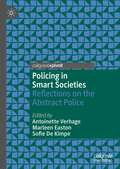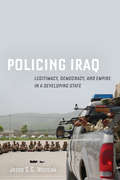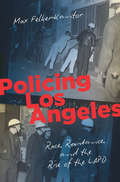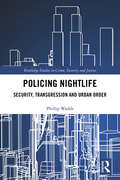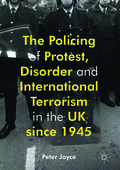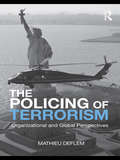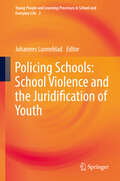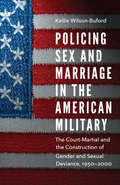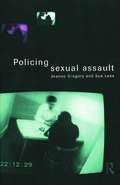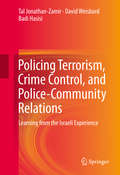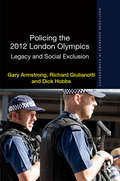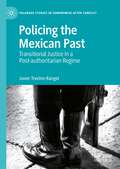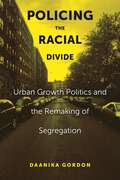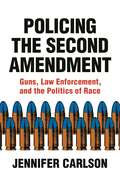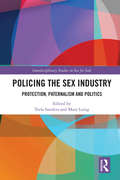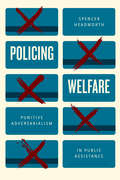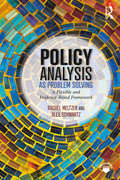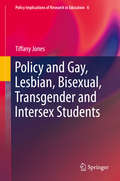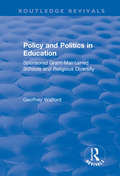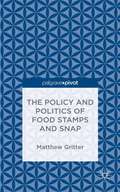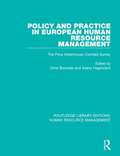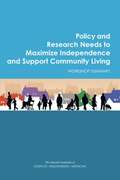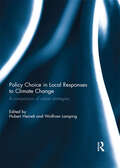- Table View
- List View
Policing in Smart Societies: Reflections on the Abstract Police (Palgrave's Critical Policing Studies)
by Antoinette Verhage Marleen Easton Sofie De KimpeSmart societies pose new challenges for police organizations. Demands for more efficiency and effectiveness test police organizations which are often resistant to change. This book uses the concept of the abstract police to describe the way in which police organizations have tried to adapt to these new evolutions and the consequences. The chapters stem from a conference called “Street Policing in a Smart Society” which sought to frame and analyse these developments in policing. In this book, the concept of the abstract police is introduced, analysed and then challenged from different angles, looking at the evolutions related to technology, plural policing, police discretion and police decision making. As such, the book is a reflection of current debates on policing and police organization, aiming to give input to the debate by providing new insights on police and police work.
Policing Iraq: Legitimacy, Democracy, and Empire in a Developing State
by Jesse WozniakPolicing Iraq chronicles the efforts of the Kurdistan Regional Government of Iraq to rebuild their police force and criminal justice system in the wake of the US invasion. Jesse S. G. Wozniak conducted ethnographic research during multiple stays in Iraqi Kurdistan, observing such signpost moments as the Arab Spring, the official withdrawal of coalition forces, the rise of the Islamic State, and the return of US forces. By investigating the day-to-day reality of reconstructing a police force during active hostilities, Wozniak demonstrates how police are integral to the modern state’s ability to effectively rule and how the failure to recognize this directly contributed to the destabilization of Iraq and the rise of the Islamic State. The reconstruction process ignored established practices and scientific knowledge, instead opting to create a facade of legitimacy masking a police force characterized by low pay, poor recruits, and a training regimen wholly unsuited to a constitutional democracy. Ultimately, Wozniak argues, the United States never intended to build a democratic state but rather to develop a dependent client to serve its neoimperial interests.
Policing Los Angeles: Race, Resistance, and the Rise of the LAPD (Justice, Power, and Politics)
by Max Felker-KantorWhen the Los Angeles neighborhood of Watts erupted in violent protest in August 1965, the uprising drew strength from decades of pent-up frustration with employment discrimination, residential segregation, and poverty. But the more immediate grievance was anger at the racist and abusive practices of the Los Angeles Police Department. Yet in the decades after Watts, the LAPD resisted all but the most limited demands for reform made by activists and residents of color, instead intensifying its power. In Policing Los Angeles, Max Felker-Kantor narrates the dynamic history of policing, anti–police abuse movements, race, and politics in Los Angeles from the 1965 Watts uprising to the 1992 Los Angeles rebellion. Using the explosions of two large-scale uprisings in Los Angeles as bookends, Felker-Kantor highlights the racism at the heart of the city's expansive police power through a range of previously unused and rare archival sources. His book is a gripping and timely account of the transformation in police power, the convergence of interests in support of law and order policies, and African American and Mexican American resistance to police violence after the Watts uprising.
Policing Nightlife: Security, Transgression and Urban Order (Routledge Studies in Crime, Security and Justice)
by Phillip WaddsNightlife is a place of both real and imagined risk, a ‘frontier’ (Melbin 1978) where apparent freedom and transgression are closely linked, and where regulation of leisure and collective intoxication has been diffused throughout an expanding network of state and private actors. This book explores Sydney’s contemporary night-time economy as the product of an intersection of both local and global transformations, as policing comes to incorporate more and more ‘private’ personnel empowered to regulate ‘public’ drinking and nightlife. Policing Nightlife focuses on the historical and social conditions, cultural meanings and regulatory controls that have shaped both public and private forms of policing and security in contemporary urban nightlife. In so doing, it reflects more broadly on global changes in the nature of contemporary policing and how aspects of neoliberalism and the ideal of the ‘24-hour city’ have shaped policing, security and night-time leisure. Based on a decade of research and interviews with both police and doorstaff working in nightlife settings, it explores the effectiveness of policies governing policing and private security in the night-time economy in the context of media, political and public debates about regulation, and the gendered and highly masculine aspects of much of this work. An accessible and compelling read, this book will appeal to students and scholars of criminology, policing, sociology and those interested in understanding the debates surrounding security, policing and contemporary urban nightlife.
The Policing of Protest, Disorder and International Terrorism in the UK since 1945
by Peter JoyceThis book examines the nature of protest and the way in which the police and state respond to the activities associated with this term. Protest is explored within the context of the perceived decline in public engagement with recent general election contests. It is often thought that protest is regarded as an alternative to, or as a replacement for, formal political engagement with electoral politics, and this book provides a thoughtful assessment of the place of protest in the contemporary conduct of political affairs. Analysing key forms of protest such as: demonstrations, direct action, protest conducted within the workplace, riots and terrorism, this study also illustrates each of these activities with a wide range of examples of events that have taken place within the UK since 1945. It will be of keen interest to students of criminology, criminal justice studies, police studies and politics.
The Policing of Terrorism: Organizational and Global Perspectives
by Mathieu DeflemThis book offers an analysis of the policing of terrorism in a variety of national and international contexts. Centered on developments since the events of September 11, 2001, the study devotes its empirical attention to important police aspects of counter-terrorism in the United States and additionally extends its range comparatively to other nations, including Israel and Iraq, and to the global level of international police organizations such as Interpol and Europol. Situated in the criminology of terrorism and counter-terrorism, this book offers a fascinating look into the contemporary organization of law enforcement against terrorism, which will significantly influence the conditions of global security in the foreseeable future.
Policing Schools: School Violence and the Juridification of Youth (Young People and Learning Processes in School and Everyday Life #2)
by Johannes LunnebladThis book examines the global phenomenon of school violence and its wide range of behaviours, from school shootings to minor theft, bullying and sexual harassment. Studying the Nordic countries and taking Sweden as an example and case study, the book discusses key features of sexuality, bullying and cyberbullying, radicalization, and violent extremism. It examines different approaches to school violence and discusses them in relation to political and ideological influences, gender relations, and socio-economic conditions. It presents trends in prevention of school violence, policing the school and dilemmas in educating against violent extremism. Since most of the research in this field has been done in post-industrial democracies such as Australia, the UK and the US, the book contributes to the debate by offering new perspectives on violence in schools from the Nordic countries.
Policing Sex and Marriage in the American Military: The Court-Martial and the Construction of Gender and Sexual Deviance, 1950–2000 (Studies in War, Society, and the Military)
by Kellie Wilson-BufordThe American military’s public international strategy of Communist containment, systematic weapons build-ups, and military occupations across the globe depended heavily on its internal and often less visible strategy of controlling the lives and intimate relationships of its members. From 1950 to 2000, the military justice system, under the newly instituted Uniform Code of Military Justice, waged a legal assault against all forms of sexual deviance that supposedly threatened the moral fiber of the military community and the nation. Prosecution rates for crimes of sexual deviance more than quintupled in the last quarter of the twentieth century. Drawing on hundreds of court-martial transcripts published by the Judge Advocate General of the Armed Forces, Policing Sex and Marriage in the American Military explores the untold story of how the American military justice system policed the marital and sexual relationships of the service community in an effort to normalize heterosexual, monogamous marriage as the linchpin of the military’s social order. Almost wholly overlooked by military, social, and legal historians, these court transcripts and the stories they tell illustrate how the courts’ construction and criminalization of sexual deviance during the second half of the twentieth century was part of the military’s ongoing articulation of gender ideology. Policing Sex and Marriage in the American Military provides an unparalleled window into the historic criminalization of what were considered sexually deviant and violent acts committed by U.S. military personnel around the world from 1950 to 2000.
Policing Sexual Assault
by Jeanne Gregory Sue LeesPolicing Sexual Assault provides a detailed account of current police practice in the UK in response to sexual assault. The authors use case studies and interviews to find out why when the number of rape cases has almost trebled since 1985, the proportion of cases resulting in a conviction has dropped from 24% to 8.6%. Chapters cover: an overview of existing research police culture police recording practices the role of the Crime Prosecution Service male rape analysis of the judicial process interviews with complainants and first-hand accounts of their experiences proposals for reform. The authors place their findings within the context of theoretical debates about domestic and sexual violence and examine the gap between official condemnations of male violence, as enshrined in law, and the realities of the victims' (male and female) experiences - whereby the violence is too often condoned.
Policing Terrorism, Crime Control, and Police-Community Relations
by Tal Jonathan-Zamir David Weisburd Badi HasisiThis timely and important work takes a critical look at the shifting role of police, who are becoming increasingly responsible for handling terrorism threats on top of their regular responsibilities. With an unprecedented empirical study, the authors of this book examine whether this increased focus on security-related threats may come at the expense of addressing "classic" police responsibilities, such as fighting crime and dealing with local, day-to-day community problems. They also examine whether this shift has had a detrimental effect on police-community relationships and perceptions of police legitimacy, as their role changes from "service" to "suspicion. " Through a four-year, multi-method study specifically focused on the Israel National Police, the authors of this work have examined the effects of this shifting role on a number of key areas of policing concern, namely: police effectiveness at fighting crime and police legitimacy, drawing conclusions applicable to any democratic police force. The results of the study provide a number of concrete recommendations for maintaining effectiveness and community relationships of the police, with increasing responsibilities, challenges, and limited resources. This work will be of interest for researchers in criminology and criminal justice, particularly with a focus on police studies and counter-terrorism; police administrators; and researchers in related disciplines, such as sociology and public administration.
Policing the 2012 London Olympics: Legacy and Social Exclusion (Routledge Advances in Ethnography)
by Gary Armstrong Richard Giulianotti Dick HobbsThe summer Olympic Games are renowned for producing the world’s biggest single-city cultural event. While the Olympics and other sport mega-events have received growing levels of academic investigation from a variety of disciplinary approaches, relatively little is known about how such occasions are experienced directly by local host communities and publics. This ethnography examines the everyday policing of the London Borough of Newham in relation to the London 2012 Olympics. It explains how police defined, monitored, prioritized, contained and investigated ‘Olympic-related’ crime, and how ‘Olympic-related’ policing connected to the policing of Newham. The authors examine how the threat of terrorism impacted on the everyday policing of the 2012 Olympics, as well as the exaggeration of other threats to the Games – such as youth gangs – for political reasons. The book also explores local resistance to Olympic policing, and the legacy of the Games with regard to policing, local housing, demographics and social exclusion. Discussing the lessons that can be learned for the future staging of sporting mega-events, this book will appeal to scholars and students with interests in sport, policing, crime and criminology, mega-events, event management, urban studies, global studies and sociology.
Policing the Mexican Past: Transitional Justice in a Post-authoritarian Regime (Palgrave Studies in Compromise after Conflict)
by Javier Trevino-RangelThis book critically examines transitional justice in Mexico. It explores how the Mexican democratic regime dealt with the grave human rights violations perpetrated by security forces during the authoritarian era (1929-2000) through a Special Prosecutor’s Office. It offers a complete account of the diverse factors that facilitated the emergence (and policing) of Mexico's transitional justice process. Whilst transitional justice should contribute to the advancement of liberal democracy and, consequently, generate the following benefits: truth, justice, political reconciliation, peace, this book argues that Mexico is a case of transitional injustice. It is an example of how in some societies transitional justice mechanisms are intentionally implemented in ways that, instead of generating justice, produce impunity. It makes important contributions to some of the broader debates addressed by scholars on transitional justice and gives them reason to re-examine transitional justice processes in other countries in a new light.
Policing the Racial Divide: Urban Growth Politics and the Remaking of Segregation
by Daanika GordonA behind-the-scenes account of the harsh realities of policing in a segregated city For thirteen months, Daanika Gordon shadowed police officers in two districts in “River City,” a profoundly segregated rust belt metropolis. She found that officers in predominantly whiteneighborhoods provided responsive service and engaged in community problem-solving, while officers in predominantly Black communities reproduced long-standing patterns of over-policing and under-protection. Such differences have marked US policing throughout its history, but policies that were supposed to alleviate racial tensions in River City actually widened the racial divides. Policing the Racial Divide tells story of how race, despite the best intentions, often dominates the way policing unfolds in cities across America.Drawing on in-depth interviews and hundreds of hours of ethnographic observation, Gordon offers a behind-the-scenes account of how the police are reconfiguring segregated landscapes. She illuminates an underexplored source of racially disparate policing: the role of law enforcement in urban growth politics. Many postindustrial cities are increasing the divisions of segregation, Gordon argues, by investing in downtowns, gentrified neighborhoods, and entertainment corridors, while framing marginalized central city neighborhoods as sources of criminal and civic threat that must be contained and controlled. Gordon paints a sobering picture of modern-day segregation, and how the police enforce its racial borders, showing us two separate, unequal sides of the same city: one where rich, white neighborhoods are protected, and another where poor, Black neighborhoods are punished.
Policing the Second Amendment: Guns, Law Enforcement, and the Politics of Race
by Jennifer CarlsonAn urgent look at the relationship between guns, the police, and raceThe United States is steeped in guns, gun violence—and gun debates. As arguments rage on, one issue has largely been overlooked—Americans who support gun control turn to the police as enforcers of their preferred policies, but the police themselves disproportionately support gun rights over gun control. Yet who do the police believe should get gun access? When do they pursue aggressive enforcement of gun laws? And what part does race play in all of this? Policing the Second Amendment unravels the complex relationship between the police, gun violence, and race. Rethinking the terms of the gun debate, Jennifer Carlson shows how the politics of guns cannot be understood—or changed—without considering how the racial politics of crime affect police attitudes about guns.Drawing on local and national newspapers, interviews with close to eighty police chiefs, and a rare look at gun licensing processes, Carlson explores the ways police talk about guns, and how firearms are regulated in different parts of the country. Examining how organizations such as the National Rifle Association have influenced police perspectives, she describes a troubling paradox of guns today—while color-blind laws grant civilians unprecedented rights to own, carry, and use guns, people of color face an all-too-visible system of gun criminalization. This racialized framework—undergirding who is “a good guy with a gun” versus “a bad guy with a gun”—informs and justifies how police understand and pursue public safety.Policing the Second Amendment demonstrates that the terrain of gun politics must be reevaluated if there is to be any hope of mitigating further tragedies.
Policing the Sex Industry: Protection, Paternalism and Politics (Interdisciplinary Studies in Sex for Sale)
by Teela Sanders Mary LaingThe exponential growth of sexual commerce, migration and movement of people into the sex industry, as well as localised concerns about transactional sex, are key areas of interest across the urban west. Given the complex regulatory frameworks under-which the sex industry manifests, the role of the police is significant. Policing the Sex Industry draws on the research and expertise of academics and practitioners, presenting advanced scholarship across a range of countries and spaces. Unpicking the relationship between police practice and commercial sex whilst speaking to the current policy agendas, Policing the Sex Industry explores key issues including: trafficking, decriminalisation, localised impacts of punitive policing approaches, uneven policing approaches, hate-crime approaches and the impact of policing on trans sex workers. A dynamic and incisive contribution to existing research, Policing the Sex Industry will appeal to undergraduate and postgraduate students, as well as researchers at all levels, interested in fields including Criminology, Sociology, Gender Politics and Women’s Studies
Policing Welfare: Punitive Adversarialism in Public Assistance
by Spencer HeadworthMeans-tested government assistance in the United States requires recipients to meet certain criteria and continue to maintain their eligibility so that benefits are paid to the “truly needy.” Welfare is regarded with such suspicion in this country that considerable resources are spent policing the boundaries of eligibility, which are delineated by an often confusing and baroque set of rules and regulations. Even minor infractions of the many rules can cause people to be dropped from these programs, and possibly face criminal prosecution. In this book, Spencer Headworth offers the first study of the structure of fraud control in the welfare system by examining the relations between different levels of governmental agencies, from federal to local, and their enforcement practices. Policing Welfare shows how the enforcement regime of welfare has been constructed to further stigmatize those already living in poverty and deepens disparities of class, race, and gender in our society.
Policy Analysis as Problem Solving: A Flexible and Evidence-Based Framework
by Rachel Meltzer Alex SchwartzDrawing extensively from real-life cases, Policy Analysis as Problem Solving helps students develop the analytic skills necessary to advise government officials and nonprofit executives on a wide range of policy issues. Unlike other texts, Policy Analysis as Problem Solving employs a pragmatic, heterodox approach to the field. Whereas most texts on policy analysis are anchored in microeconomics, emphasizing economic efficiency, this book takes a broader view, using realistic examples to illustrate the full scope of policy analysis. The book provides succinct but thorough discussions of the key elements of the policy-analytic process, including problem definition, objectives and criteria, development of alternative policy options, and analysis of these alternatives. The text’s practical approach and extensive downloadable resources—which include interviews, case studies, and further readings—will be of enormous benefit to both students and instructors of policy analysis.
Policy and Gay, Lesbian, Bisexual, Transgender and Intersex Students
by Tiffany JonesThis book addresses policy research on homophobic and transphobic bullying in schools. It covers quantitative and qualitative research into policy impacts for gay, lesbian, bisexual, transgender and intersex students. It draws on a large-scale Australian study of the impacts of different kinds of policy at the national, state, sector and school level. The study covers over 80 policies, interviews with key policy informants and survey data from 3,134 GLBTIQ students. Since new guidelines were released by UNESCO, homophobic and transphobic bullying in schools has become a key area of interest around the world. There has been much pressure on educational leadership to engage with these issues since the UN released international human rights legislation on sexual orientation and gender identity that have implications for student rights. The book presents statistically significant correlations between specific types of state and school level education policies that explicitly named homophobia/ GLBTIQ student issues, and lowered incidence of homophobic bullying, lowered risk of suicide and self-harm for these students. It includes stories from policy makers on how the policies came to be (through lawsuits, ministerial inquiries and political activism), right through to the stories of students themselves and how they individually felt the impacts of policies or policy lacks. International contexts of homophobic and transphobic bullying are discussed, as well as recent transnational work in this field. The book considers the different types of collaborations that can lead to further policy development, the transferability of the research and some of the benefits and problems with transnational policy adoptions.
Policy and Planning for Endangered Languages
by Mari C. JonesLanguage policy issues are imbued with a powerful symbolism that is often linked to questions of identity, with the suppression or failure to recognise and support a given endangered variety representing a refusal to grant a 'voice' to the corresponding ethno-cultural community. This wide-ranging volume, which explores linguistic scenarios from across five continents, seeks to ignite the debate as to how and whether the interface between people, politics and language can affect the fortunes of endangered varieties. With chapters written by academics working in the field of language endangerment and members of indigenous communities on the frontline of language support and maintenance, Policy and Planning for Endangered Languages is essential reading for researchers and students of language death, sociolinguistics and applied linguistics, as well as community members involved in native language maintenance.
Policy and Politics in Education: Sponsored Grant-maintained Schools and Religious Diversity (Routledge Revivals)
by Geoffrey WalfordThis title was first published in 2000: This is an examination of the sponsored grant-maintained schools initiative. These schools were an attempt to increase the diversity of schools within the state-maintained sector so families would have a greater choice when selecting the most desirable school for their children. Thus allowing schools to be run by religious and ethnic minority groups. The book considers and analyzes the political nature of the policy formulation and implementation. It examines the way the 1993 Education Act came to be formulated and follows its path within the changing social, economic and political context of the years 1993 to 1998. The text examines the background to the applications for funding from religious minority and other groups and discusses the implications of such a changes in funding policy in the context of the 1998 School Standard and Framework Act.
The Policy and Politics of Food Stamps and SNAP
by Matthew GritterFood Stamps, now known as the Supplemental Nutrition Assistance Program (SNAP), has endured and expanded in recent years. As the largest federal program dealing with food insecurity, it touches the lives of forty million Americans. How is that possible in the age of conservative ascendancy, resistance to federal intervention, and an increasingly threadbare safety net? Food Stamps and SNAP has endured through being included in the Farm Bill, from being characterized as a program for the deserving poor and as a safety net of last resort. At various times these proposal have been promoted by former President George W. Bush and other Republicans. While the program remains intact, it remains vulnerable to challenges institutionally and ideologically. This book seeks to explore and the resilience of Food Stamps/SNAP since the Personal Responsibility Act of 1996. Gritter provides a unique look at a program that ballooned in participation during the 2000s, even prior to the economicrecession that began in December 2007.
Policy and Practice in European Human Resource Management: The Price Waterhouse Cranfield Survey (Routledge Library Editions: Human Resource Management)
by Chris Brewster Ariane HegewischThis volume, first published in 1994, lays out and considers the evidence of trends in HRM in a variety of areas: overall strategy, the role and education of HR professionals, recruitment, training and development, pay, industrial relations, communication, flexibility, equal opportunities and EC social policy. Because the research examined data at the organisational level, the book is able to provide a unique analysis of what is happening in HRM in the very different cultures of European states, both EC and EFTA. This volume is an indispensable source for all teachers and students of European HRM practices and policies. This book will also be a key reference source for practitioners wishing to understand HRM in the various European countries and to ‘benchmark’ their organisation against current practice.
Policy and Research Needs to Maximize Independence and Support Community Living: Workshop Summary
by National Academies of Sciences Engineering MedicineLiving independently and participating in one’s community are priorities for many people. In many regions across the United States, there are programs that support and enable people with disabilities and older adults to live where they choose and with whom they choose and to participate fully in their communities. Tremendous progress has been made. However, in many cases, the programs themselves – and access to them – vary not only between states but also within states. Many programs are small, and even when they prove to be successful they are still not scaled up to meet the needs of the many people who would benefit from them. The challenges can include insufficient workforce, insufficient funding, and lack of evidence demonstrating effectiveness or value. To get a better understanding of the policies needed to maximize independence and support community living and of the research needed to support implementation of those policies, the National Academies of Sciences, Engineering, and Medicine convened a public workshop in October 2015. Participants explored policies in place that promote independence and community living for older adults and people with physical disabilities, and identified policies and gaps in policies that can be barriers to independence and the research needed to support changing those policies. This report summarizes the presentations and discussions from the workshop.
Policy Choice in Local Responses to Climate Change: A Comparison of Urban Strategies
by Hubert Heinelt and Wolfram LampingSince the 1990s ‘beliefs’, ‘ideas’ or ‘knowledge’ as well as processes of communicative interactions such as persuasion, argumentation and learning have received increasing attention in social science for the understanding of political changes. This book makes a significant contribution to this scholarly debate and will be of interest to practitioners, showing on one side how climate change has received more and more attention in policy making at the local level and changed the urban agenda and on the other how different the responses of cities to this global challenge are – and how these differences between cities can be explained. This book was previously published as a special issue of Urban Research and Practice.
Policy Debates in Comparative, International, and Development Education
by John N. Hawkins W. James JacobThe complementary areas of comparative, international, and development education occupy a critical part of the landscape in educational policy debates in a global context. This volume brings together a distinguished group of international scholars and practitioners who focus on key policy issues in a variety of national settings throughout the regions of Asia/Pacific, Africa, the Middle East, Europe, North America, and Latin America. The topics they address are critical for the future of education in a globalized context and include issues such as social justice, quality assurance, governance, access and equity, marketization, and the role of new media and technology, among others. "
